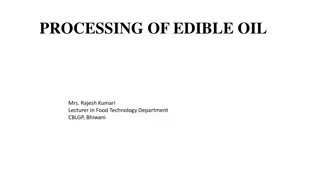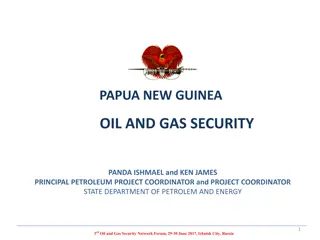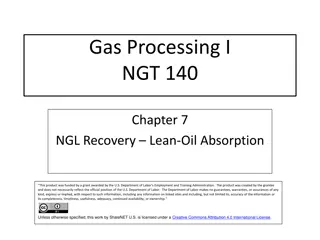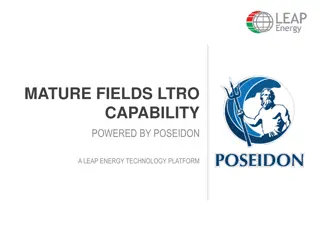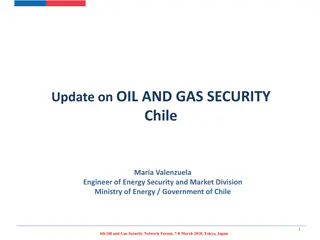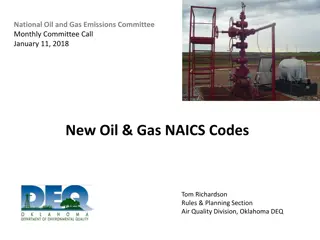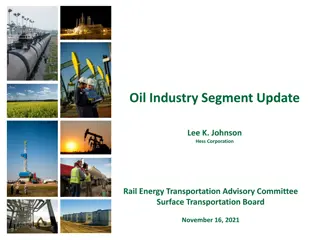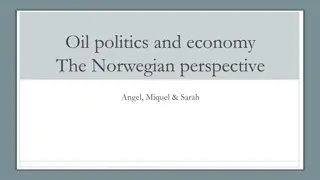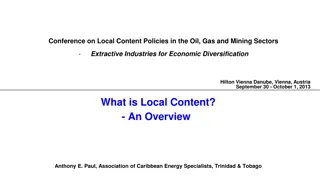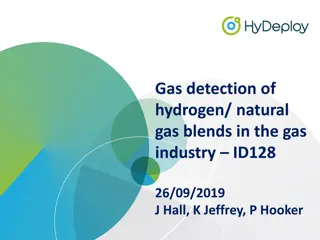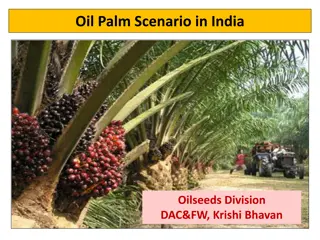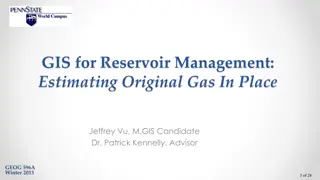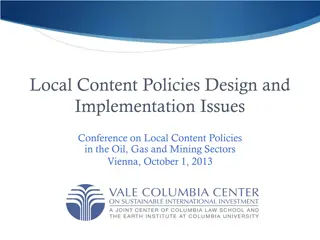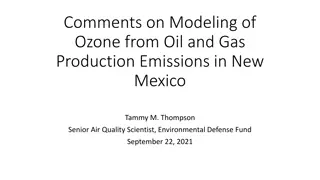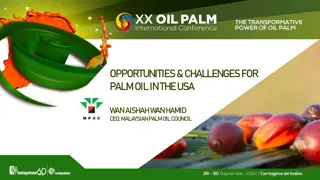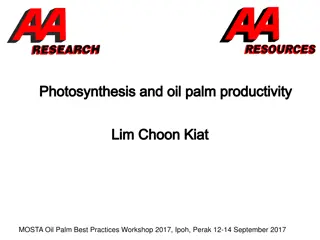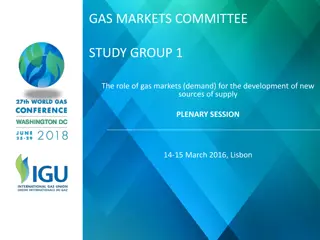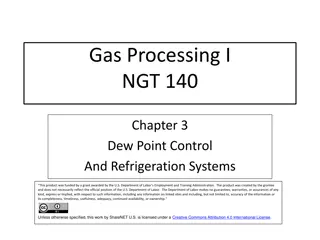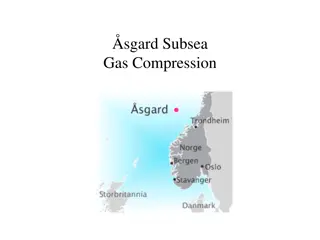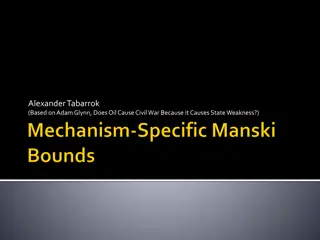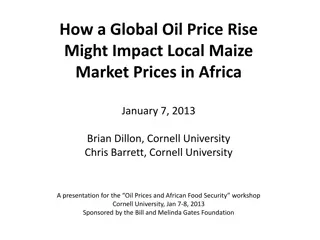Local Content Requirements in Oil & Gas Sectors: Comparative Analysis
This comprehensive analysis explores the impact of Local Content Requirements (LCRs) in the oil and gas sectors, focusing on models from Norway and Brazil. It discusses relevant WTO disputes, legislative policies, macroeconomic implications, and the inhibitory effects on competitiveness and foreign investments. The Norwegian model emphasizes production chains, while the Brazilian approach targets the O&G sector directly, showcasing key differences. Lessons learned, challenges, and future prospects are highlighted.
Download Presentation

Please find below an Image/Link to download the presentation.
The content on the website is provided AS IS for your information and personal use only. It may not be sold, licensed, or shared on other websites without obtaining consent from the author. Download presentation by click this link. If you encounter any issues during the download, it is possible that the publisher has removed the file from their server.
E N D
Presentation Transcript
Aluisio de Lima-Campos Chairman, ABCI Institute; Adjunct Professor, American University Washington College of Law Vienna, September 30, 2013
General aspects of LCRs The Norwegian and Brazilian Models Relevant WTO disputes and provisions Lessons learned and final remarks
Country Legislation/Policy Year enacted 2003 Focus Brazil Local Content Legislation Oil concession Trinidad & Tobago Local Content & Local Participation Framework Law of the Republic of Kazakhstan; 223-IV 2004 In-country fabrication Kazakhstan 2009 Procurement & services Indonesia Local Content Rules 2009 Procurement of domestic inputs Nigeria Local Content Act 2010 Indigenous participation and domiciliation of oil and gas activities Source: ADO, Rabiu. Local content policy and the wto rules of traderelated investment measures (trims): the pros and Cons. International Journal of Business and Management Studies. Aberdeen: Vol.2(1), 2013, p.137-146.
macroeconomic and short-term: strengthening demand directed to the domestic market and employment expansion; more specific focus and long-term perspective: (i) diversification of the industrial sector; (ii) development of technology-intensive sectors and high growth potential; (iii) build relevant segments to enhance national security
The policy inhibits benefited sectors from becoming more competitive vis a vis foreign suppliers; The consequent trend is then reduction of investment in R&D and innovation; Costs associated with the acquisition of inputs increase; and Resulting disincentive to further investments by foreign investors in the country.
Norwegian Model (oil & gas) Focused in the production chain not in the sector; The Norwegian government could add local companies in the operators list of suppliers; The more the operators contracted with Norwegian suppliers the greater their chances in subsequent biddings.
Focused in the O&G sector; LCR set by Government (ANP) in concession bidding notice; LCR based on percentage of local inputs; Requirement of certification of LC and audit of reports; No sunset provisions
Law/Regulation What does it establish? Law No. 9.478 of 6 August 1997 Minimum local content requirements are established in licensing round for the award of oil and gas exploration and production rights, and change over time and for different type of acreage (based on relative maturity and location) Specific commitments are set out in petroleum contracts. Law No. 12.276 of 30 June 2010 Authorizes the federal government to cede at a cost to Petr leo Brasileiro SA - PETROBRAS the exercise of research and production of oil, natural gas and other fluid hydrocarbons in the areas of Pre-Salt Law No. 12.304 of 2 August 2010 Authorizes the Executive to create the company Empresa Brasileira de Administra o de Petr leo e G s Natural S.A. - Pr -Sal Petr leo S.A. (PPSA) Law No. 12.351 of 23 December 2010 The text provides for the exploration and production of oil, natural gas and other fluid hydrocarbons, under the regime of production sharing in areas of pre-salt and strategic areas ANP Regulation No. 6/2007 Resolution No.36/2007 Specify the criteria and procedures for the calculation and certification of local content ANP Regulation No. 8/2007 and Resolution No. 38/2007 Specify the procedure for audit of local content certification ANP Regulation No. 9/2007 and Resolution No. 39/2007 Specify the reporting procedure and format
Bidding 1 2 3 4 5 6 7 8 9 10 Year 1999 2000 2001 2002 2003 2004 2005 2006 2007 2008 Nature (requirements ) No requirements of LC in bidding notice. LC commitments are offered by interested parties in their respective bids. Global LC minimum percentages are set in bidding notice. Commitment with additional % for certain activities may be offered by bidding parties. Global LC minimum and maximum percentages are set in the bidding notice for the phases of exploration and development, as well as minimum percentages for items defined by the bidding party. Definition Supplier location Domestically manufactured goods (LC of more than 60% in 2000; more than 40% thereafter) and, by 2001, for Services Provided in the Country (more than 80%) Calculation methodology to quantify LC by Supplier of Goods and Services Evidence No proof of LC required Requirement to report quarterly spending on national and foreign goods and services Required Declaration of Origin by supplier Requirement of certificates of domestic content by accredited bodies Source: GUIMAR ES, Eduardo Augusto. Confedera o Nacional da Ind stria. Pol tica de conte do local na cadeia do petr leo e g s: uma vis o sobre a evolu o do instrumento e a percep o das empresas investidoras e produtoras de bens / Confedera o Nacional da Ind stria Bras lia : CNI, 2012.
Libra Oilfield Santos Basin (11 companies bidding) May compete consortia composed of up to five companies with a R$ 610 million minimum investment; The winner will be established based on the best return for the Brazilian government, with a price established at between US$100-120 p/barrel; Petrobras is the operator, with a minimum share of 30%, and can also participate in a bidding consortium; A signing bonus of R$15 billion must be paid to the Brazilian government.
For the exploration phase, the minimum LC is 37%. For the development phase, the corresponding figure is 55% for the first oil produced until 2021 and 59% thereafter.
Lack of incentives to and lack of firm commitment by local industry to become competitive Open-ended protection of local industry; No planned gradual reduction of LCRs overtime; No clear goals; High administrative costs.
DS412 - Canada Certain Measures Affecting the Renewable Energy Generation Sector Japan alleged that Canada s use of LCR was not in accordance with GATT and TRIMS agreements. Canada argued that its program was consistent with Art III:8(a) of GATT because the LCRs have environmental objectives and were not for profit. The WTO AB agreed with Japan (May 6, 2013).
DS456 - India Certain Measures Relating to Solar Cells and Solar Modules (Complainant: United States) The U.S. (Feb. 6, 2013) started a DS case against India related to LCR under the Jawaharial Nehru National Solar Mission ( NSM ) for solar cells and solar modules claiming that the program is inconsistent with GATT and TRIMS agreements; No decisions issued yet.
Art III:4 GATT: National Treatment Principle The products of the territory of any contracting party imported into the territory of any other contracting party shall be accorded treatment no less favorable than that accorded to like products of national origin in respect of all laws, regulations and requirements affecting their internal sale, offering for sale, purchase, transportation, distribution or use. The provisions of this paragraph shall not prevent the application of differential internal transportation charges which are based exclusively on the economic operation of the means of transport and not on the nationality of the product.
Art III:5 GATT: No contracting party shall establish or maintain any internal quantitative regulation relating to the mixture, processing or use of products in specified amounts or proportions which requires, directly or indirectly, that any specified amount or proportion of any product which is the subject of the regulation must be supplied from domestic sources. Moreover, no contracting party shall otherwise apply internal quantitative regulations in a manner contrary to the principles set forth in paragraph 1.
Art. III:8 GATT (a) regulations or requirements governing the procurement by governmental agencies of products purchased for governmental purposes and not with a view to commercial resale or with a view to use in the production of goods for commercial sale. The provisions of this Article shall not apply to laws, (b) payment of subsidies exclusively to domestic producers, including payments to domestic producers derived from the proceeds of internal taxes or charges applied consistently with the provisions of this Article and subsidies effected through governmental purchases of domestic products. The provisions of this Article shall not prevent the
SCM Agreement, Art.1.1: 1.1 For the purpose of this Agreement, a subsidy shall be deemed to exist if: (a)(1) there is a financial contribution by a government or any public body within the territory of a Member (referred to in this Agreement as government ), i.e. where: (i) a government practice involves a direct transfer of funds (e.g. grants, loans, and equity infusion), potential direct transfers of funds or liabilities (e.g. loan guarantees); (ii) government revenue that is otherwise due is foregone or not collected (e.g. fiscal incentives such as tax credits); (iii) a government provides goods or services other than general infrastructure, or purchases goods; (iv) a government makes payments to a funding mechanism, or entrusts or directs a private body to carry out one or more of the type of functions illustrated in (i) to (iii) above which would normally be vested in the government and the practice, in no real sense, differs from practices normally followed by governments;
SCM Agreement 3.1(b): 3.1 Except as provided in the Agreement on Agriculture, the following subsidies, within the meaning of Article 1, shall be prohibited: (b) subsidies contingent, whether solely or as one of several other conditions, upon the use of domestic over imported goods.
Articles 2.1 and 2.2 TRIMs Agreement; 1. obligations under GATT 1994, no Member shall apply any TRIM that is inconsistent with the provisions of Article III or Article XI of GATT 1994. Without prejudice to other rights and 2. An illustrative list of TRIMs that are inconsistent with the obligation of national treatment provided for in paragraph 4 of Article III of GATT 1994 and the obligation of general elimination of quantitative restrictions provided for in paragraph 1 of Article XI of GATT 1994 is contained in the Annex to this Agreement.
The Art.III: 3(b) of Government Procurement Agreement establishes that: With respect to all laws, regulations, procedures and practices regarding government procurement covered by this Agreement, each Party shall ensure: that its entities shall not discriminate against locally-established suppliers on the basis of the country of production of the good or service being supplied, provided that the country of production is a Party to the Agreement in accordance with the provisions of Article IV.
Art. 177 of Brazils Constitution According to this article, the Union has the monopoly of research, exploration and refinement of oil, natural gas and other fluid hydrocarbons. Therefore, the government is directly responsible for purchasing goods and contracting services for those activities, through government procurement; In accordance with the Art. 177 1 of the Brazilian Constitution: The Union may contract with state or private companies through tendering for services of research, development and exploration in accordance with specific law.
The specific Law (Law No. 9.478 of 6 August 1997) in its Art. 5, allows the Brazilian Government to offer through tendering concessions in the sector of Oil and Gas. This is done by the Brazilian Government s National Petroleum Agency. In other words, it is a government transaction involving government property and acquisition of services to explore and develop that property. GPA provisions would not apply, because Brazil is not a signatory.
LCRs are desirable when the social benefits associated with it are greater than the resulting losses from cost of production increases (focus on maximizing competitiveness, welfare, not LC); Works better in countries that have a stable macroeconomic environment; Not a sure cure against Dutch Disease , unless other policies are applied to deal with persistent distortions (currency overvaluation, relative interest rates); It should stimulate the production chain through incentives and not hinder it through market reserve policies (policy should include clear goals and a system of rewards and penalties for those goals); LCRs should be temporary and contain a phase-out mechanism,
LCR policies in the O&G sector can achieve economic and social objectives if adequately designed and implemented. Policy design should give due attention to and avoid international trade law violations. In the absence of DSB precedents, more WTO disputes on LCR policies are possible. Coverage of all instances of LCR, however, may require a specific multilateral understanding for the O&G sector.


